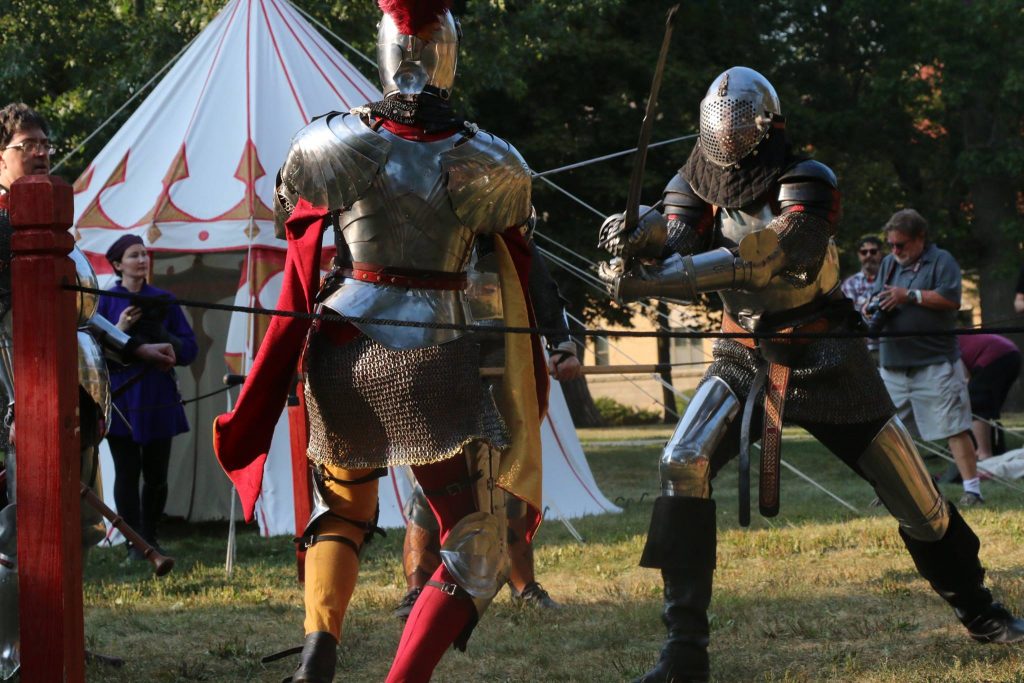Last Saturday morning at 5:30am I began a trip from Vancouver to the town of Monroe in Washington state, about 3 hours south of Vancouver, with five of my students from Academie Duello. It was our yearly trip to a rapier tournament held by the Society for Creative Anachronism called Ursulmas. This particular tournament gets a permanent spot in our schedule because it is very well attended (between 60 and 90 fighters participate in the main tournament of the day) and it draws practitioners from all over the Pacific Northwest, with an incredibly varied set of approaches and skill levels.
This tournament is a great opportunity for senior students of Academie Duello to test and expand their practice beyond its fundamental base. You can read more of my thoughts on why I think it's valuable to train symmetrically and then asymmetrically in this article.
On the way down, I asked everyone what their personal goals were for the day. It's typical to set your eyes on "winning" the tournament or placing at a particular level, but the reality is that tournaments have few winners, not everyone is in a position in their tournament skillset to contend for top spots, and your performance is relative to that of others. What I wanted was for everyone to set their own internal objective that:
- fit into their own long-term goals
- was fully controllable by them
- could help them stay mentally focused on their own journey throughout the day.
Tournaments and Mastery
In the path of mastery, I see tournaments as a tool to help challenge, inspire, and expand one's practice. They're not for everyone, and they're a poor end in and of themselves if your goals are long-term and martial (meaning you have a desire to develop something richer than simply the capacity to score points).
To fit tournaments into the mastery journey it helps to step outside of their inherent structure and make them work for you. I recommend my students set goals that fit into one of a few categories:
- Psychological - Is there a particular mental state you want to practice? Staying calm, being collected, keeping a mental presence, or having fun? Tournaments can be a great place to practice internal skills.
- Mechanical - Placing your martial form under pressure can help you more deeply implement the mechanics of some skills and give you a useful diagnostic of what still needs improvement.
- Strategic - Applying particular strategies and observing their success can be a particularly effective use of tournament time.
Strategies and Questions
It's useful to take a goal and determine a strategy for how you're going to help keep it in your mind and realize it. One simple way to do this is to identify a question or two you can ask yourself during or between bouts. For example: "How am I doing at being calm?" or "Did I keep myself in guard throughout that engagement?" It's also a question your coach or training partners can ask you. The goal here is simply to help you remember your focus.
If you're pushing yourself into some new territory, for example, if you usually get stressed out and you're endeavouring to stay calm, make sure you have a strategy for practising your new mental state (like practising breathing exercises before or after fights). If you're seeking to keep to a particular physical form, making sure you reset to a particular posture anytime you're out of range of your opponent or use a specific sword position as a touchstone for how you want to hold your body.
Personal Goals and the Side Benefits of Tournaments
Having your own personal goals will help you use the tournament in a way that is most effective for what you value rather than what others might think you should get out of it. They can also be an effective way to increase your performance. Having your own fully controllable outcome puts you in much greater control of your psychology. If things aren't going your way, simply return your focus to your goal, ask your questions, and remember why you're there.
Tournament Mastery is not a Requirement
Tournaments can get a lot of hype. They're easy for outsiders to understand and they fit into a gold medal narrative that is pushed in many corners of our culture. However, they're just one of the dozens of ways of deepening your understanding and practice. If they don't suit you, don't sweat it. There are many highly effective martial paths that don't include tournaments—a lot of military and police trainers avoid this type of training specifically because they feel it can create false rewards that can be harmful to their trainees. I have had times where I loved tournaments and couldn't get enough of them, and times where what I really wanted to do was solo forms. Find your bliss and approach the challenges that you feel test you where you want to be tested.
Enjoy your path, your training, and your challenges.
